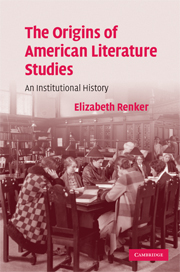Book contents
- Frontmatter
- Contents
- Acknowledgments
- Introduction
- Chapter 1 The birth of the Ph.D.: The Johns Hopkins research model
- Chapter 2 Seminary wars: female teachers and the seminary model at Mount Holyoke
- Chapter 3 Higher education for African Americans: competing models at Wilberforce University
- Chapter 4 Literary value and the land-grant model: The Ohio State University
- Conclusion: the end of the curriculum
- Notes
- Bibliography
- Archives consulted
- Index
Conclusion: the end of the curriculum
Published online by Cambridge University Press: 22 September 2009
- Frontmatter
- Contents
- Acknowledgments
- Introduction
- Chapter 1 The birth of the Ph.D.: The Johns Hopkins research model
- Chapter 2 Seminary wars: female teachers and the seminary model at Mount Holyoke
- Chapter 3 Higher education for African Americans: competing models at Wilberforce University
- Chapter 4 Literary value and the land-grant model: The Ohio State University
- Conclusion: the end of the curriculum
- Notes
- Bibliography
- Archives consulted
- Index
Summary
The emergence of video-game studies as a new kind of college and university program provides one current illustration of the ways that the curricular canon repeatedly redefines knowledge. A broad sector of the adult American public views the world of video gaming as a mindless, distracting, and perhaps even dangerous form of recreation that opposes, rather than embodies, what we hope to teach. Those who hold a competing view see gaming as a deeply engaging and stimulating form of fun and even as a new mode of critical thinking. We live in the transformative moment in which the cultural uncertainty about the meaning of video games is moving toward resolution by tipping them into the curriculum. Once they become curricular in a more widespread fashion, they will achieve knowledge status, and the terms of the present debate about their value will shift once again.
A century ago, the identity of American literature was undergoing a kindred process of cultural flux. Its image, too, was initially antithetical to the very idea of a higher curriculum. This conception held that American literature lacked seriousness; its materials were too chronologically close to current life to warrant scholarly treatment; it had no academic pedigree; people enjoyed reading it, so it didn't require attention in school; grade-school kids could understand it, so it didn't merit college status; and college students, when you let them have it, consumed it enthusiastically. Surely no subject with those qualities belonged in higher education.
- Type
- Chapter
- Information
- The Origins of American Literature StudiesAn Institutional History, pp. 126 - 143Publisher: Cambridge University PressPrint publication year: 2007



